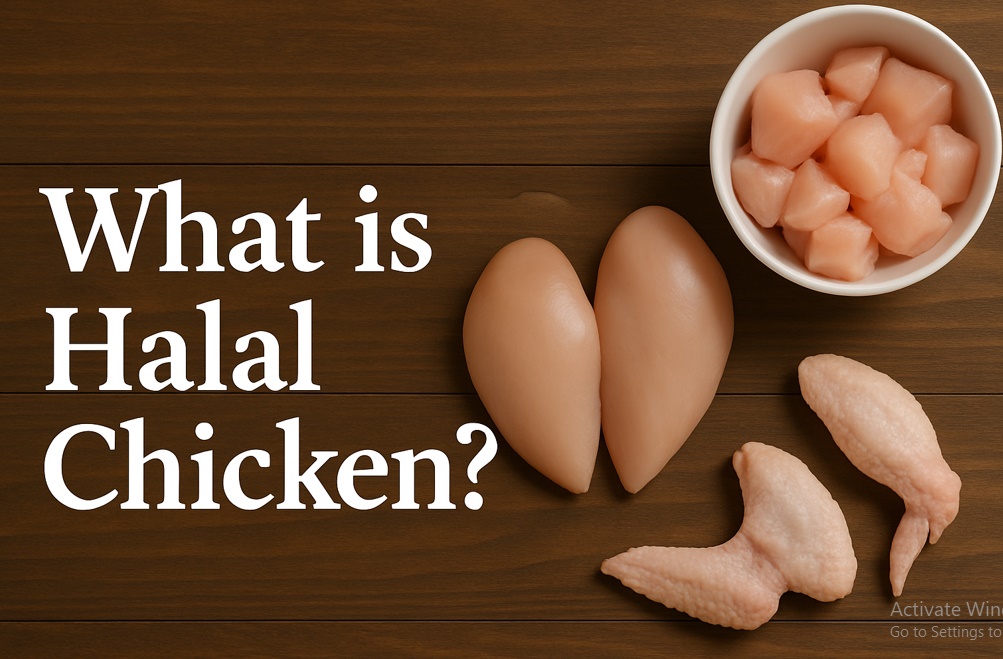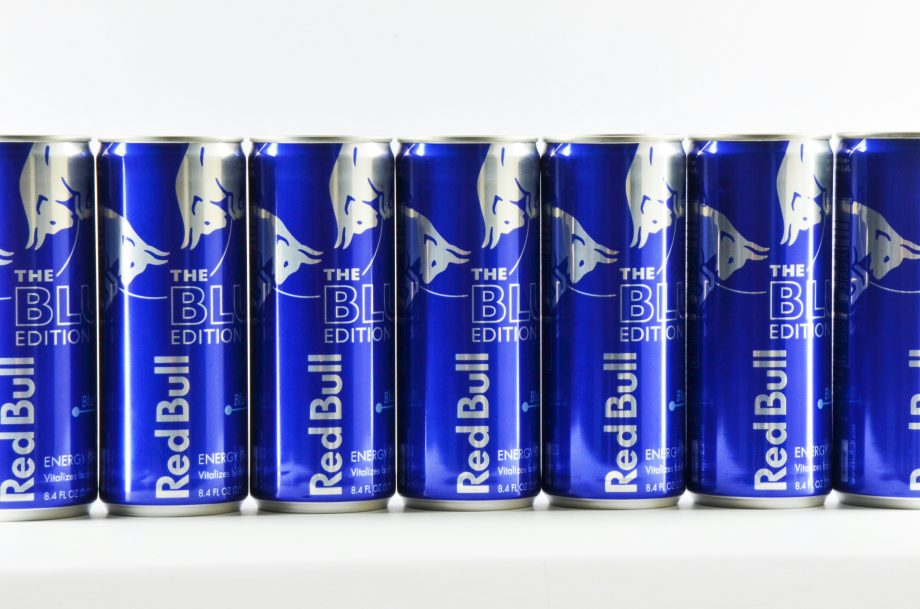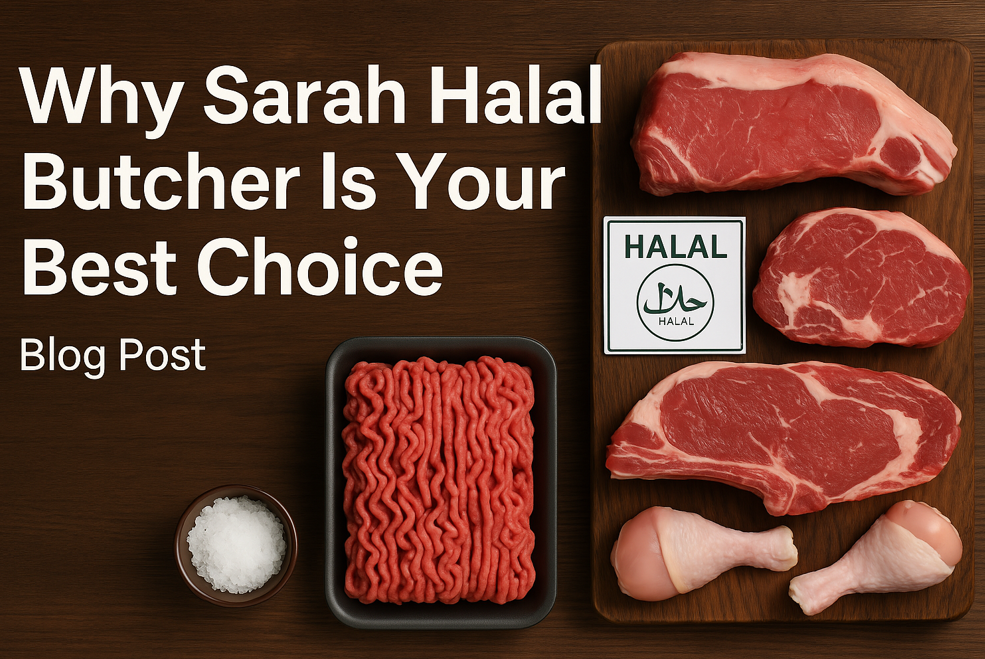People are becoming more conscious in this era about the food they consume. Whether it’s about health, ethical farming, or religious beliefs, one question that often comes up in conversations is, “What is halal chicken?” You’ll hear it asked in grocery stores, fast food restaurants, and online forums—and not just by Muslims.
This growing curiosity is especially noticeable in Western countries like the USA, Canada, and the UK. As multicultural communities expand and awareness spreads, more people are paying attention to how meat is sourced, prepared, and served. It’s not uncommon to see halal options on menus at popular chains or to find halal-certified chicken in major supermarkets. The increased demand reflects a broader shift toward ethical and conscious consumption.
But halal chicken is not just a trend—it’s a deeply rooted practice in Islamic tradition. At its core, it represents a balance of faith, hygiene, and humane treatment. So, what exactly is halal chicken? How is it different from regular chicken? And why is it becoming so popular even among non-Muslim consumers? In this article, we’ll explore the complete picture—from understanding the religious significance and slaughtering method to reviewing popular halal chicken brands. This guide will give you a clear and practical understanding of what halal chicken really means today.
Understanding Halal Chicken:
When we talk about halal chicken, it’s important to understand the process that makes the chicken “halal” in the first place. The word “halal” is Arabic for “permissible,” and it refers to food that meets the dietary guidelines set out in Islam. So, halal chicken isn’t just about the type of meat—it’s about how the chicken is slaughtered, processed, and prepared.
The Halal Slaughtering Process:
For chicken to be considered halal, it must be slaughtered according to Islamic law. This means:
- Animal Health: The chicken should be healthy at the time of slaughter.
- Name of Allah: The slaughtering must be done by a Muslim who recites the name of Allah (God) before performing the slaughter. This is an essential part of the halal process and signifies the spiritual respect for life.
- Method of Slaughter: A sharp knife is used to swiftly cut the chicken’s throat, windpipe, and blood vessels in the neck. This ensures that the chicken dies quickly and with minimal suffering. The blood is drained from the animal because, in Islamic dietary laws, consuming blood is prohibited.
- Cleanliness and Hygiene: After slaughter, the meat is processed in clean facilities to prevent contamination and ensure the meat remains free of any harmful substances.
Why Halal Chicken is Different from Regular Chicken:
The difference between halal chicken and regular chicken lies primarily in the slaughter process and the treatment of the animal. While both types of chicken are eventually prepared for consumption, halal chicken is viewed as more humane due to the specific guidelines it follows, such as ensuring the animal’s death is as quick and painless as possible.
Many consumers believe halal chicken tends to be fresher. Since the slaughter process requires draining the blood completely, halal chicken is considered to have less residual blood, which some argue contributes to a cleaner taste and texture.
How is Halal Chicken Prepared?
The preparation of halal chicken follows strict guidelines that not only fulfill religious requirements but also prioritize animal welfare and hygiene. The process begins with the slaughtering method, known as the Zabiha method, which is central to ensuring the chicken meets halal standards.
The Zabiha Method of Slaughter
The Zabiha method is a traditional Islamic way of slaughtering animals for food. For chicken to be halal, it must be slaughtered according to this practice, which involves several important steps:
- The Animal’s Health: The chicken must be healthy at the time of slaughter. This ensures that the meat is not contaminated by disease or illness, and it aligns with ethical standards for animal treatment.
- The Role of the Slaughterer: The chicken is slaughtered by a Muslim who is of sound mind and who follows the principles of Islam. The individual must recite the phrase “Bismillah Allahu Akbar”, which translates to “In the name of God, God is the Greatest” before making the cut. This prayer ensures the slaughter is done with respect for the life of the animal and in obedience to God’s will.
- Method of Slaughter: A sharp knife is used to make a swift, single cut to the chicken’s throat, severing the windpipe and blood vessels. This allows the chicken to bleed out, which is a critical part of the halal process, as consuming blood is prohibited in Islam. The Zabiha method ensures that the chicken’s death is quick and as humane as possible, minimizing suffering.
- Hygiene and Cleanliness: Once the chicken is slaughtered, the meat is carefully processed in clean facilities to avoid contamination. This attention to cleanliness helps ensure the meat is safe and of high quality.
The Role of Prayer During Slaughter
The prayer said during the slaughter process is an essential part of making the chicken halal. The recitation of “Bismillah Allahu Akbar” is not just a religious formality but a reminder that the slaughter is being done in accordance with Islamic teachings, which emphasize respect for all living creatures. The prayer signifies a moment of gratitude and reflection. It emphasizes that the slaughtering of the chicken is not to be done carelessly or thoughtlessly, but with a sense of reverence for the life being taken. This spiritual element is one of the key factors that distinguish halal chicken from non-halal chicken.
Guidelines from Organizations on Humane Treatment
Several organizations, such as Compassion in World Farming (CIWF), emphasize the importance of humane treatment of animals during slaughter. These organizations support practices that ensure the chicken’s welfare is prioritized, which aligns with the principles of halal slaughter. According to CIWF, the Zabiha method, when carried out correctly, can be considered one of the more humane methods of slaughter, especially because it requires minimal suffering and ensures a swift and clean process. The CIWF and other animal welfare groups encourage transparency in food sourcing and processing. Many halal-certified facilities take pride in maintaining high standards of animal welfare, making sure the chickens are treated ethically and slaughtered quickly and painlessly.
Why Halal Chicken is Often Fresher:
A number of Reddit users have shared their thoughts on why halal chicken is often perceived as fresher compared to regular chicken. Some have pointed out that halal chicken is processed and slaughtered with more care, especially in smaller, more specialized facilities. The blood drainage process, required by halal standards, is believed to contribute to fresher meat because the blood is removed entirely, which can help preserve the quality of the chicken.
Some Reddit discussions suggest that because halal chickens are often slaughtered in smaller batches and handled with greater care, they may not sit on shelves as long as conventional chicken, making them seem fresher. Moreover, the cleaning and handling process for halal chicken, which emphasizes hygiene, might also contribute to a cleaner taste and higher freshness compared to non-halal options.
Halal Chicken vs. Regular Chicken
The debate between halal chicken and regular chicken is growing, especially in Western countries like the USA, Canada, and the UK, where people are becoming more conscious about what they eat. The biggest differences come down to preparation, quality, and health impact. Halal chicken is prepared using the zabiha method, where the animal is slaughtered with a swift cut while a prayer is said. One major part of this process is the complete drainage of blood, which helps remove impurities. As a result, halal chicken often has a cleaner, fresher taste and a softer texture compared to regular chicken.
There are also differences in how the chickens are raised. Many halal brands, like Lilydale Chicken and Bon Pollo Chicken, avoid the use of antibiotics and growth hormones. In contrast, regular chicken—especially from large-scale farms—may include both, raising concerns about long-term health risks. Halal chicken is not just about religion—it’s about clean eating, ethical treatment, and better flavor. With the rise in demand for healthier and more ethical food choices, halal chicken is standing out as a trusted option on supermarket shelves and menus across the West.
Is Halal Chicken More Affordable and Fresher?
A common discussion on platforms like Reddit and food blogs revolves around this question: Why does halal chicken often seem fresher—and sometimes even cheaper—than regular chicken? One reason is turnover. In many areas across the USA, Canada, and the UK, halal meat shops and suppliers have a high demand, which means their stock moves quickly. When chicken is sold the same day it arrives or is freshly processed in-store, it naturally tastes fresher.
This is something users consistently highlight in Reddit discussions—especially in diverse cities like Toronto and New York. Halal suppliers also tend to follow more ethical and hands-on practices, particularly those that align with Islamic dietary laws. These include ensuring animals are well-treated, fed clean diets, and not injected with unnecessary hormones or antibiotics.

As for affordability, halal chicken is often sold in local butcher shops or community-owned stores, bypassing some costs associated with large commercial retailers. This can make prices more competitive compared to big-brand chicken like Coles Chicken. So, is halal chicken more affordable and fresher? In many cases, yes. But beyond price and taste, it’s the ethical, mindful approach to food that’s drawing more people toward halal choices.
Popular Halal Chicken Brands and Stores
As the demand for halal chicken grows across the USA, Canada, UK, and Australia, several trusted brands and stores have stepped up to meet consumer needs. Whether you’re shopping at your local supermarket or searching for certified options online, here are some popular names to know:
Lilydale Chicken – A household name in Australia, Lilydale is known for offering premium free-range chicken. While not all Lilydale products are halal, the brand does provide clearly labeled halal-certified options, making it easier for Muslim families to shop with confidence.
Bon Pollo Chicken – Recognized for its halal-friendly poultry, Bon Pollo is appreciated by communities that value clean, responsibly sourced chicken. The brand focuses on quality and transparency, which has helped build trust across diverse markets.
Coles Chicken – One of Australia’s largest supermarket chains, Coles offers a variety of halal-certified chicken products in select stores. Consumers can find halal-labeled packs in the meat section, making it a convenient option for everyday grocery needs.
Perdue Chicken – Perdue is a major chicken supplier in the USA. While not all of their products are halal, Perdue has acknowledged offering halal options under specific labeling, especially for food service and select markets. Always look for the halal certification mark before purchasing.
Halal Fast Food & Fried Chicken Chains
For those craving halal fried chicken without compromising on flavor or faith, the USA now offers a growing list of fast-food chains catering to Muslim communities. Here’s a closer look at some of the most talked-about names:
- Kennedy Fried Chicken – A staple in many urban areas across the East Coast, Kennedy Fried Chicken is known for its affordable, crispy, and halal-certified offerings. It’s a go-to spot for late-night bites and family meals alike.
- Dave’s Hot Chicken – Famous for its fiery spice levels, Dave’s Hot Chicken has quickly gained popularity. The best part? It’s fully halal certified, making it a favorite for heat lovers who want to stick to halal guidelines.
- Kikis Chicken – With its focus on comfort food and generous portions, Kikis Chicken includes halal menu options in various locations. Their crispy wings and chicken tenders hit the spot for many halal foodies.
- Jones Fried Chicken – This fast-growing chain offers flavor-packed halal fried chicken, appealing to customers looking for bold taste with peace of mind.
- Wingstop Halal – Is Wingstop halal? In select locations, yes. Many outlets now offer halal-certified chicken, especially in high-demand areas. Always check with the store before ordering.
- Krispy Krunchy Chicken Halal? – Some locations do serve halal meat, but it’s not universal. Call ahead or check for halal signage at your local store to be sure.
- Chick Fil A – While Chick Fil A is widely loved, it does not offer halal meat in the USA or Canada at this time. Some opt for their vegetarian sides or fish options instead.
Why Halal Chicken Is Gaining Global Popularity:
The demand for halal chicken is growing rapidly—not just among Muslims, but also among health-conscious and ethically minded consumers around the world. From the USA to Canada, the UK, and even parts of Australia, more people are choosing halal chicken for its purity, ethical treatment, and trusted sourcing.
One major reason behind this trend is the zabiha method, which ensures the animal is treated with respect, slaughtered humanely, and drained of blood, improving both taste and texture. Halal is more than just a dietary requirement—it’s a symbol of purity and mindfulness. The growing interest in animal welfare, natural meat (free from hormones and antibiotics), and ethical farming is pushing even non-Muslim consumers to explore halal options.
With increasing availability in mainstream supermarkets and fast food chains, halal chicken is no longer niche—it’s going mainstream. People trust halal certification for its strict guidelines, and in a world where food quality is under constant scrutiny, that trust makes all the difference.
Final Thoughts about What is halal Chicken?:
Trying halal chicken can be a surprisingly eye-opening experience—not just for those following Islamic dietary laws, but for anyone who cares about ethical food choices, quality, and flavor. Whether it’s the tenderness of halal fried chicken, the clean taste of halal chicken nuggets, or the peace of mind that comes from knowing how the meat was sourced, halal food offers something meaningful to everyone.
If you’ve never had halal chicken before, give it a try. You might be surprised at how flavorful and fresh it tastes. More importantly, you’ll be supporting a food system that values humane treatment of animals, clean slaughtering practices, and transparency. As halal food becomes more available across supermarkets and fast food chains in countries like the USA, Canada, and the UK, it’s easier than ever to find certified products. Just be sure to read the labels carefully and look for reliable halal certification symbols to ensure what you’re buying truly meets halal standards. In the end, choosing halal chicken is about making an informed, conscious choice—one that supports your values and satisfies your taste buds.
Frequently Asked Questions:
What is the difference between halal chicken and regular chicken?
Halal chicken follows Islamic slaughtering rules, including a prayer and draining blood. Regular chicken may not follow these steps. Halal also avoids harmful additives, focusing on cleanliness and ethical practices.
What makes a chicken halal?
A chicken becomes halal when it’s slaughtered according to Islamic law—by a Muslim, with a prayer, using a sharp knife, and ensuring the blood is fully drained. The animal must also be healthy before slaughter.
Why is halal chicken better?
Many believe halal chicken is better because it’s more humane, cleaner, and free from harmful chemicals. The meat is often fresher and tastes better due to the blood-draining process and ethical standards followed.
How can you tell if chicken is halal?
Look for certified halal labels from trusted authorities on packaging. Ask the supplier or check for signs like “zabiha halal.” Certification symbols and transparency in sourcing confirm authenticity.
What is halal chicken price?
Halal chicken prices vary by region and brand. Generally, it can be slightly more or even cheaper than regular chicken, depending on supply and demand, especially in places like the USA, UK, or Canada.
Halal chicken vs regular chicken
Halal chicken is ethically slaughtered under Islamic laws, while regular chicken may not follow such methods. Halal is often hormone-free and cleaner, which appeals to both Muslim and non-Muslim consumers.
Does halal chicken taste different?
Yes, many say halal chicken tastes fresher and cleaner because of the blood-draining process. The meat tends to be tender and more flavorful due to the careful handling and humane slaughtering practices.
What is halal meat?
Halal meat comes from animals slaughtered according to Islamic law, with a prayer said at the time of killing and proper blood drainage. It excludes pork and meat from animals not slaughtered properly.
Halal chicken vs organic chicken
Halal chicken focuses on religious and ethical slaughtering, while organic chicken is raised without antibiotics or GMOs. Both prioritize quality, but halal emphasizes spiritual purity, and organic focuses on how the chicken was raised.
Halal chicken process
The halal process involves slaughtering the chicken by hand, reciting a prayer, and draining all the blood. The bird must be healthy, and the process must follow strict hygiene and humane standards.
Halal chicken benefits
Halal chicken is often cleaner, fresher, and more humane. It’s free from harmful additives, and many believe it has better taste and texture. It also aligns with ethical and spiritual values for many consumers.



